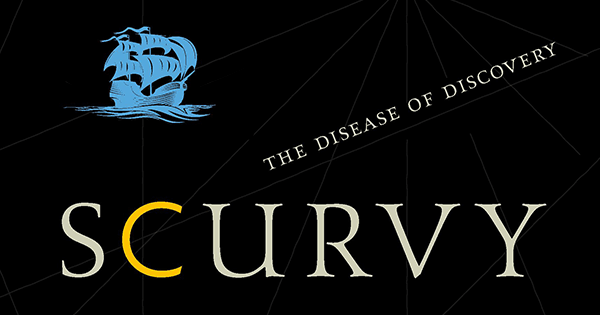Scurvy: The Disease of Discovery
Read an excerpt from Jonathan Lamb’s new book about every sailor’s favorite ailment

Scurvy! The word immediately conjures up images of pirates and sailors pining for crates of citrus. In his new book, Scurvy: The Disease of Discovery, Jonathan Lamb tells the scorbutic story of the high seas, from Europe outward to the Pacific Ocean. As 18th-century British sailors discovered new realms, scientists were also making discoveries in the worlds of medicine and disease—and specifically about the most dreaded of shipboard malaises.
If there were two sorts of discovery going on—on the one hand, unrolling the map of the world and, on the other, revealing what had lain hidden in the sensations, passions, sickness, and contingent circumstances of the voyager—of what exactly did the second discovery consist? Well, scurvy was an inevitable accompaniment of long periods at sea. Although it was capricious with regard to the speed of its onset and the signs of its presence, no one could avoid it who lived for more than three months on preserved food; yet despite what many surgeons and physicians believed, it wasn’t a disease a person caught, like yellow fever or typhus, it came about when the source of some vital principle in food ceased to be supplied to the body. That is to say, it was owing to an innate infirmity in the human constitution that the mere mass of food could not remedy. It was a sort of essential starvation. Specialists in gases like Thomas Beddoes even referred to it as suffocation, or dry drowning, believing that victims were suffering from a huge deficit of oxygen. The symptoms plied between horrid dissolution of the body and an extraordinary susceptibility of mind; they were evinced by magnified sensations and tearful melancholy, seasoned every now and then with visions of the right kind of food and sometimes the ravishing experience of tasting and swallowing it. So if scorbutic patients were to open their mouths, they would discover (in the sense of reveal as well as find) blackened gums and very loose teeth; or if they bared their legs, they would discover blood spots and ulcers. If they talked (and they were prone to be very circumstantial), they would spend many words trying unsuccessfully to provide a full tale of the spectrum of their miseries, exhibiting a weakness of mind and fraught emotions typical of the disease. Was this why scurvy could lay claim to being a disease of discovery, because in the effort of finding exotic lands and peoples, it came upon its victims like a surprise, manifest in their own bodies and feelings?
Scurvy’s first attested appearance in literature is to be found in Luis Vaz de Camoens’s The Lusiads (1572), a poem celebrating Vasco da Gama’s expedition into the Indian Ocean, where the word “discover” is handled in the two different ways I have outlined. It bears the primary meaning of finding out by toil the remotest boundaries of the sea, but it has another deriving from the fact that the places da Gama discovered were already thriving ports, not at all receptive to overtures from a tattered mariner regarding trading treaties with Portugal. In rejecting da Gama’s embassy, the king of Calicut demanded (according to the journal of the first voyage) why they came so far without gifts: “To this the captain rejoined that he had brought nothing because the object of his voyages was merely to make discoveries. … The king then asked what it was he [had] come to discover: stones or men?” Timothy Hampton draws this interesting conclusion: “What da Gama ‘discovers’ is, in effect, his own journey.” What might have been sustained as a fiction of embassy is transformed into an exercise of self-authentication, da Gama’s own greater truth concerning the accidents and perils of traversing an unknown sea: his imagined role as representative of the Portuguese Crown supplanted, like Othello’s, by a tale of moving accidents.
Excerpted from Scurvy: The Disease of Discovery by Jonathan Lamb. © 2017 by Princeton University Press. Reprinted with permission.


